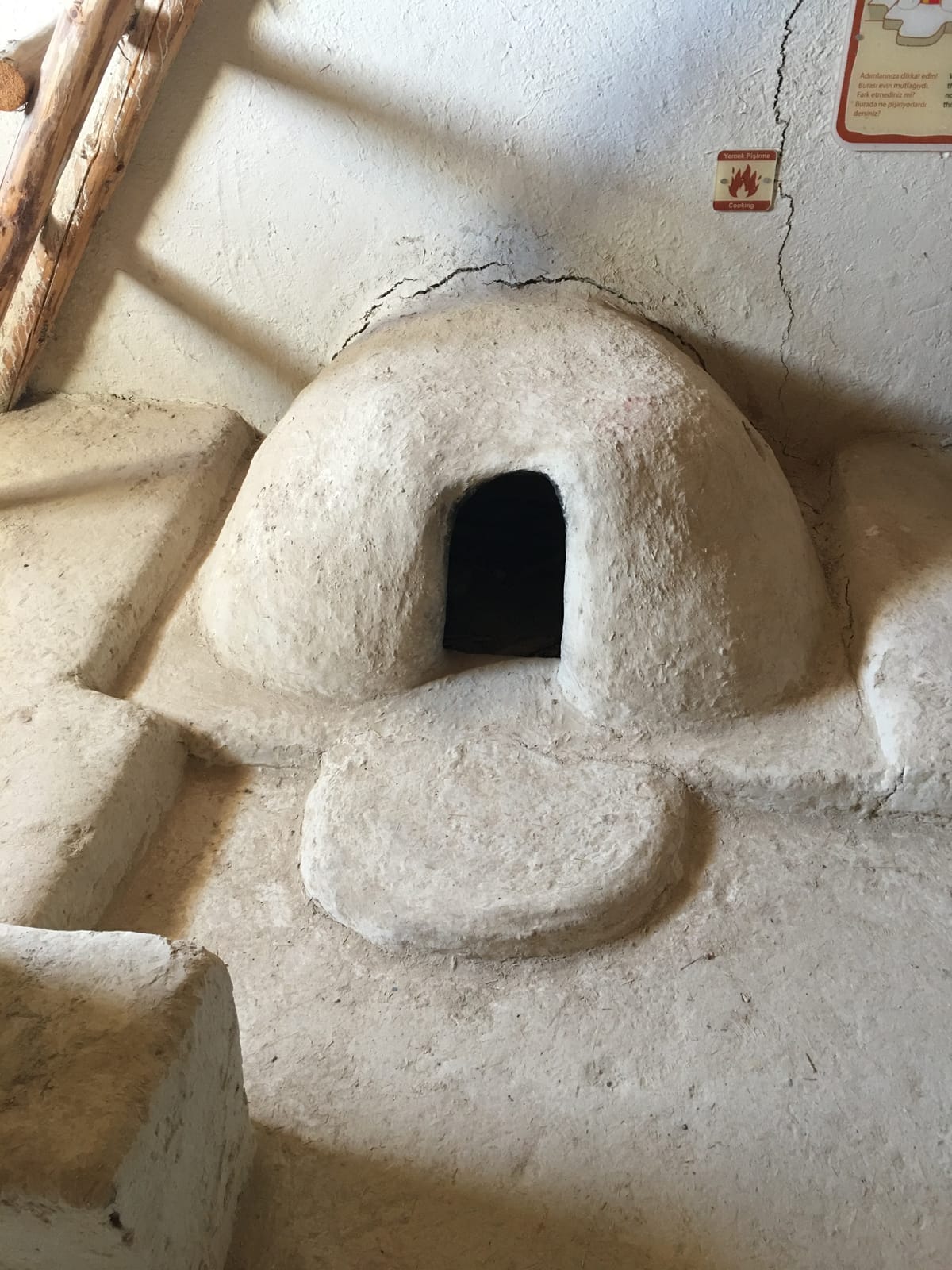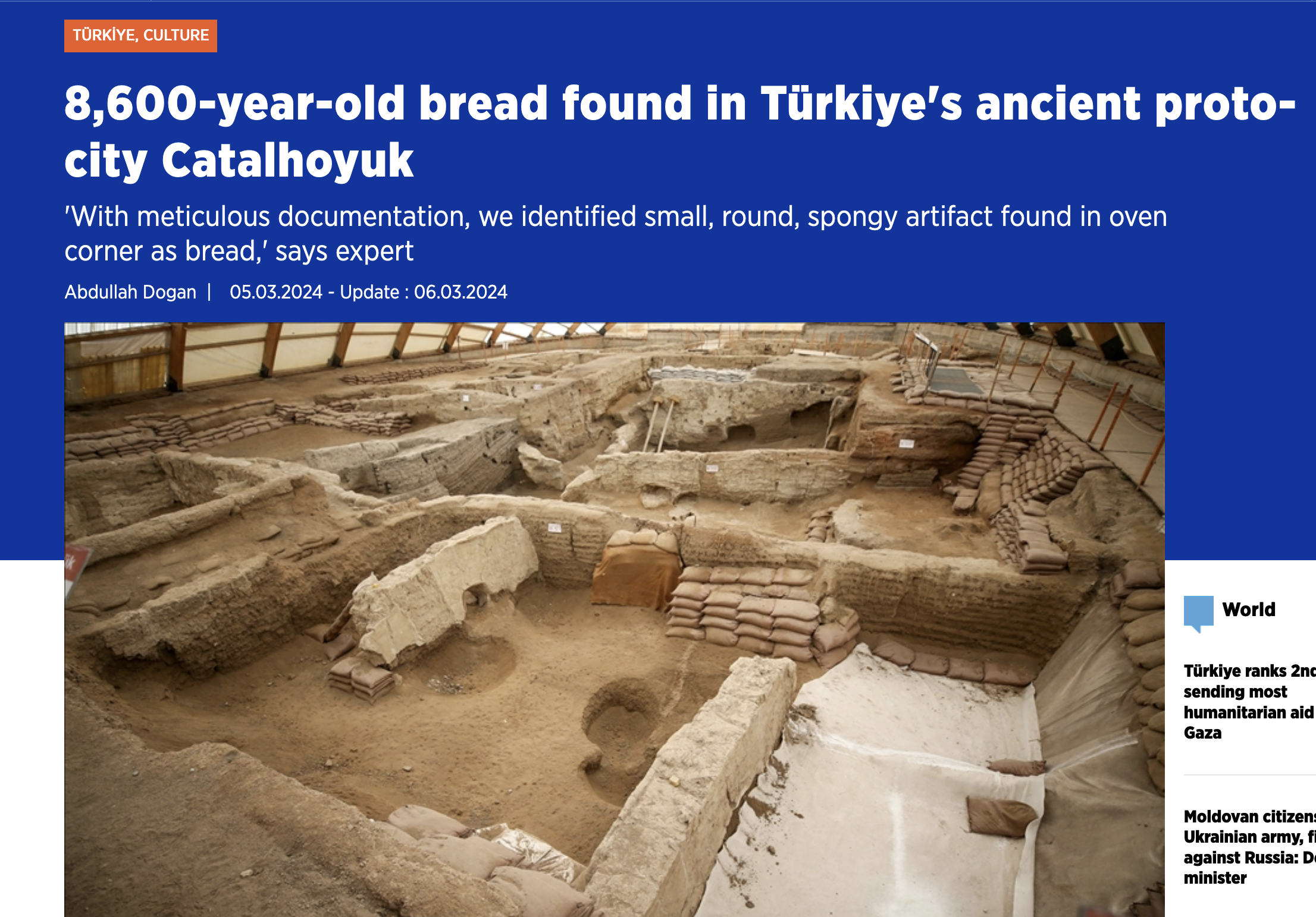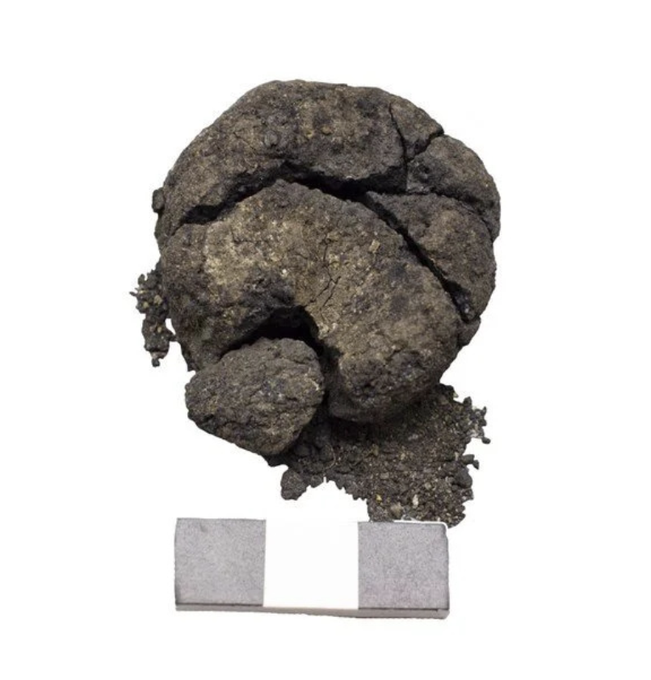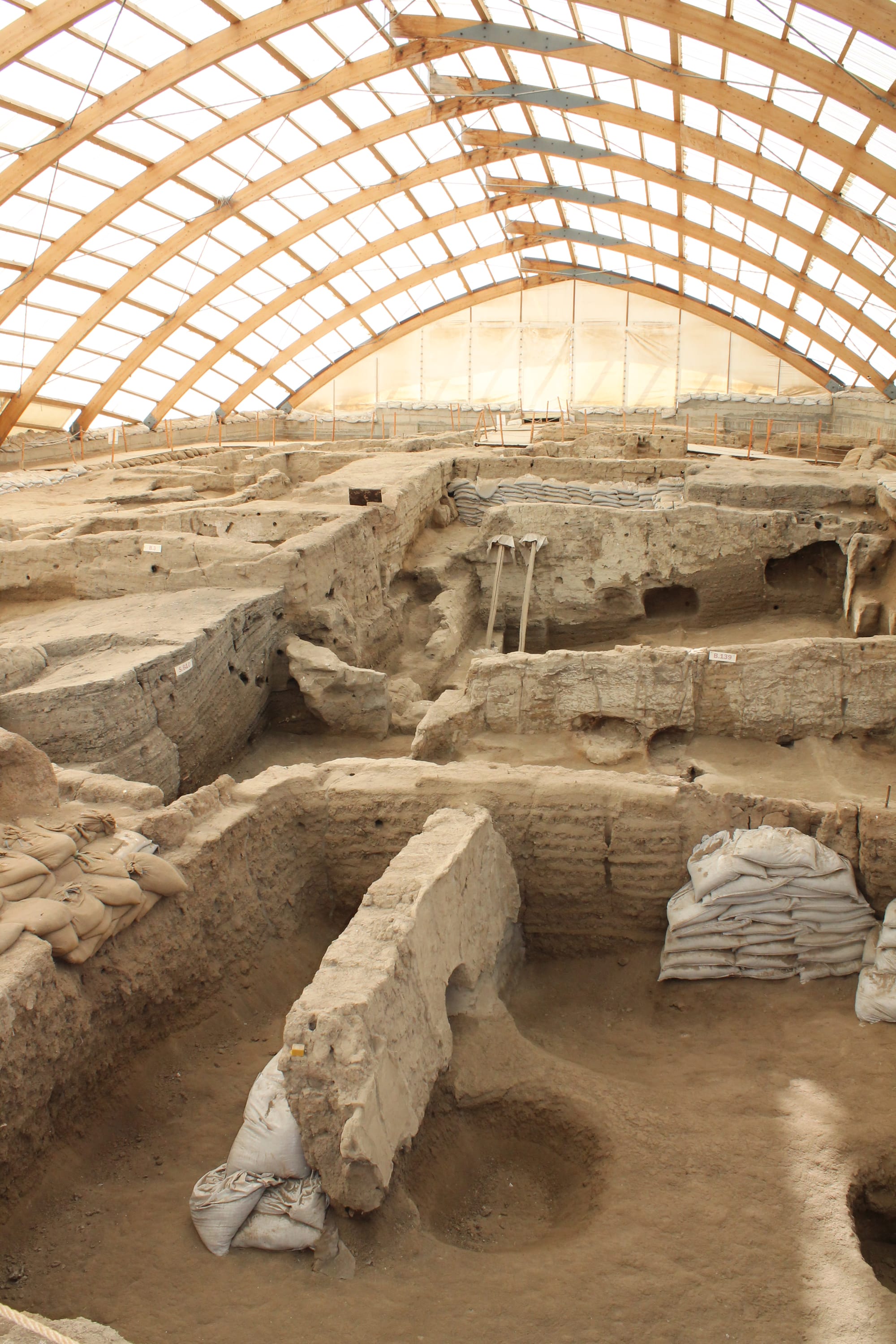The Oldest Bread in the World

May Be 8,600 Years Old. (Unless, That Is, You Count Those 14,400-Year-Old Crumbs...)
// There's a kerfuffle rising in the world of grainheads—those lovers of all things bread-y, and doughy, and wheat-y—this month. (I've become one of them, and maybe you should too: we're good company, if a trifle detail-oriented, and if the conversation loses its appeal, there's almost always something hot, nutritious, and delicious to eat close to hand.)
A click-bait headline showed up on Google News, announcing the discovery of an intact sample of 8,600-year-old bread at a site in central Turkey. That got me very interested, because I'd been to the site in question, Çatalhöyük, near Konya, and had written about it in my book The Lost Supper. Bread remains had been found in abundance there, and I documented my attempts to recreate the Neolithic flatbread made on a near-daily basis at this proto-city, whose population may have been as high as 8,000 at certain points in its 1,100 year history. (You can read about my adventures in archeo-baking here.) But the remains in question were fragments: crumbs, mostly. The find being announced this time was a large lump of unbaked dough, near a severely damaged oven: "a palm-sized artifact... containing wheat, barley, and pea seeds, likely used for food."

The site director, Ali Umut Turkcan of Andalou University, was quoted on the Turkish news website this way: "Considering observations, analyses, and dating, we estimate this organic residue to be approximately 8,600 years old. It's a miniature version of a loaf of bread. It hasn't been baked in the oven but has fermented, preserving the starches. Such an example hasn't existed until now. Catalhoyuk has always been the center of many firsts." Turkcan is then quoted as saying: "We can say that this finding in Catalhoyuk is the world's oldest bread."

That's how I started a post on X sharing the find, along with some photos of the lumpy looking dough. To my knowledge, the earliest substantial "loaves" of bread found up to that point had been Egyptian, found in the tombs of pharaohs and other elites, and preserved by the aridity of the desert. I saw some of these in the remarkable Museo Egizio in Turin, Italy, last year, a visit I wrote about in this post.
The oldest loaves from Egypt are in the 3,000 to 4,000-year-old range, so it seemed plausible that this find did set the record. In the thread, I added that much older evidence of bread-making had been found in Jordan. I interviewed one of the archaeobotanists responsible for the find, Amaia Arranz-Otaegui, then at the University of Copenhagen. Here's what I wrote in The Lost Supper:
" Arranz-Otaegui excavated a circular stone-lined fireplace at a Paleolithic archaeological site known as Shubayqa 1 in the Jordanian desert. After analyzing plant remains, she realized that the site’s occupants, herders of goats and gazelles known as the Natufians, were collecting and grinding the seeds from stands of wild grasses, and stocking them in round elevated structures, the first known grain storehouses.
Archaeologists had long known that dense stands of wild wheat could be efficiently harvested; it took agricultural historian Jack Harlan just one hour to gather two pounds of clean grain from wild wheat in Turkey, using scythes with blades of sharpened stone. On that basis, he estimated that it would take a small family three weeks to harvest enough grain to sustain them for an entire year. But until Arranz-Otaegui’s work, there had never been any evidence that Paleolithic people processed wild cereals. It turned out the charred plant remains she’d found were the earliest known crumbs of bread.
“ 'This evidence was showing us for the first time that bread was not a product of the Neolithic period,'” Arranz-Otaegui marveled. 'It was invented by hunter-gatherers.' ” In other words, a 'civilization' wasn’t required to make bread, at least not in the sense of a class-divided society, with specialized labor and a ruling elite. 'I believe that we will find even older evidence of bread-making, dating to twenty thousand years ago.' The find, which also predates the earliest evidence of beer-making, shows that well before we were farmers, we were bakers."
The Shubayqa 1 site dates to 14,400 years ago, putting the bread remains into the Paleolithic. But what is found there was evidence of bread-baking. The interesting thing about the 8,600-year-old dough found at Çatalhöyük is that it actually is bread—or at least, it was about to become bread, if it had made it into that now-damaged oven.
This week, some friends have forwarded me a post on a site called Hyperallergic.com with the provocative headline (more click-bait!) "Discovery of 8,600-Year-Old Bread Gives Rise to Half-Baked Claims," which you can find here. Authors Sarah Bond and Stephanie Wong write:
"Neither the archaeologist’s official comments to the Anadolu Agency nor the press release about the discovery mention Natufian food production, referencing only Egyptian bread, often made of a grain called emmer. Egyptians are believed to have used yeast to leaven their bread beginning around 4000 BCE, but they also made unleavened bread, remains of which still survive today. Mesopotamians have already used yeast for beer-making since about 6000 BCE. As such, Çatalhöyük may indeed qualify as having the oldest extant leavened bread known, but the press release’s bombastic language is much more totalizing, seemingly re-centering Çatalhöyük as the indisputable epicenter for food history."
Bond and Wong then explain how the Turks have taken over the site, and are using it to boost nationalist claims about Anatolia being the site of the origins of agriculture, an argument that has also been used as the justification for seizing seed samples kept at the British Institute at Ankara. On the part of the Turks, there seems to have been a bit of paranoia involved, along with an ill-advised plan to use the seeds to grow Turkish "super-foods" to sell to the world.

Now, there's no question that there's a lot of nationalistic posturing going on these days. However, you could argue that this is a natural corrective to all those decades when western archaeologists, in particular the British, dominated the digging in Turkey, and foreign archaeology extracted artefacts from less-wealthy nations, often using the finds as evidence of an uninterrupted line of greatness from Mespotomia-Egypt-Greece-Rome to London, Paris, Washington (or whatever the New Athens of choice happened to be). Bond and Wong's basic point, however, is correct: Turkcan, if he was correctly quoted on the state-owned website, overstepped when he said the Çatalhöyük dough was "the world's oldest bread." We do have that older evidence of breadmaking, in the form of those crumbs from Jordan.
I reached out to Arranz-Otaegui, and her colleague Lara González Carretero, on X; they've collaborated before, and Carretero, a lecturer in archaeobotany at the University of York, has done important work on bread remains at Çatalhöyük. Carretero replied: "This is an incredible find and I'm very happy it was found, it almost made my PhD worth doing." She added: "An issue here is that they presented this find as 'the oldest bread in the world' and did not mention previous work at the site from which we already knew there was bread."
For Arranz-Otaegui, the big issue is that the announcement seems premature (which suggests to me that there may indeed have been some "nationalistic" pressure to get the news out.) "It looks like a wonderful find," she writes, "but the key difference with Shubayqa is that there is no scientific publication accompanying the press release. No data = no way to confirm it represents a 'fermented bread' or any other type of cereal-based food."
In other words, a little enthusiasm is understandable. But, until a proper peer-review happens, and the results are published, let's not go re-writing the record books.
On that point, I think everyone can agree.
